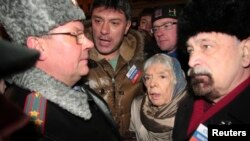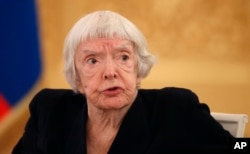On December 10, 1948, the United Nations General Assembly adopted the Universal Declaration of Human Rights. Two years later, the date December 10 was designated International Human Rights Day. On December 10, 1977, the Soviet authorities placed 20 prominent dissidents under house arrest to prevent a planned silent vigil on Moscow’s Pushkin Square to protest government repression.
Despite the crackdown, the silent vigil on Pushkin Square became a tradition for Soviet dissidents, with protesters gathering there in subsequent years on December 10 only to be dispersed and arrested. Following the collapse of the Soviet Union in 1991, the tradition was revived in 2009.
As in the Soviet period, human rights groups are subjected to state persecution in today’s Russia. They are forced to register as “foreign agents” and fined if they refuse to do so. The offices of some human rights organizations have been the targets of arson attacks; human rights activists have been beat up, and sometimes murdered.
The Moscow Helsinki Group, Russia’s oldest human rights group, has seen repression under both the Soviet and the Russian authorities. It was founded in 1976 to report on Soviet human rights abuses and to monitor Soviet compliance with the Helsinki Accords, signed the previous year to improve relations between the Communist bloc and the West.
The group’s chairwoman, Lyudmila Alekseyeva, is a founding member. She spoke to VOA Russian service reporter Danila Galperovich in Moscow about the human rights situation in Russia, past and present.
Q: What aspect of the human rights situation in Russia now most concerns you? Which problem is the most acute?
A: It’s hard to say; each person in Russia feels that the problem that is ruining their life is the most severe one. Soldiers will say that it is the powerlessness of the soldier; women say domestic violence, discrimination at work; those who are involved child welfare will say it’s the rights of children.
From my point of view, the human rights situation would be very substantially improved if we had competent, independent courts because all the problems rest ultimately on the fact that we do not have courts which are independent of the authorities. In a majority of instances, our courts resolve cases in the interests of the authorities, and not in the interests of citizens.
If we had independent and competent courts, we would be very close to the rule of law. But that [the rule of law] cannot happen if, say, the courts are independent but the legislative branch is dependent on an executive branch that swallows up the mass media... Either all institutions are independent, or it is not a democracy, but rather an authoritarian state.
Q: Some even say that in Russia, the state is not simply authoritarian, but approaching totalitarian. What do you think?
A: No, it is not totalitarian. I remember the Stalin period, when we really lived in a totalitarian state. I was already an adult then – I was 25 years old when Stalin died (in 1953). I know that what we have now is, thank God, not totalitarianism, but authoritarianism, which is quickly taking all of us "back to the USSR." In our country, there were periods when citizens felt free and the government did not oppress them, but such periods were rare and short.
In this sense, our generation was quite lucky, because in the period after the collapse of the Soviet Union and until the early 2000s, we had a relatively free society; the authorities did not suppress it. But we have no tradition of democracy, no political culture, a very weak civil society that just came into being and is not able to defend its rights and freedoms.
And simply a society infected by paternalistic, parasitical sentiments, because during the many centuries of our history, individuals could not control their fate. They were very dependent on the state, on wealthy people. And this created a corresponding psychology – one, I would say, that is childishly gullible and easily controlled by shameless propaganda.
Q: Why do you think the Russian government not only does not support human rights activists, but actively persecutes them? Human rights activists don’t threaten the state, they don’t impinge on issues of security, so what is the problem?
A: The fact is that our motives are completely incomprehensible to them. This state sincerely believes that we are its enemies, that we are a "fifth column."
Those at the top believe this so sincerely because they think that those citizens who think independently and insist on respect for the law, not for the “understandings” that our top officials live by, are enemies. We are probably considered even greater enemies than the political opposition, which is more comprehensible to them because at least it is trying to gain power.
But we are fighting to ensure that the authorities respect human rights here and now. And they don’t understand why we are doing that.
Q: But, judging from Russian social networks, it is not only government officials who have negative views of human rights activists, but also many ordinary citizens. Russians don’t have much respect for those trying to defend their rights. They are not even very aware of your activities. What is that?
A: That is not entirely true; it depends upon your point of reference. Inasmuch as I participated in the human rights movement from the very beginning, even during its fetal period, I know how much the situation has changed for the better.
Today, in any case, the vast majority of the population knows that there are human rights defenders. They have differing views of them, but they know that such people exist. They know the phrase “human rights,” and even representatives of the authorities know these words, and know they have to talk about respecting human rights. That doesn’t mean they actually do respect them, but that is still great progress compared to the Soviet period.
Immediately after the collapse of the Soviet Union, when we started to set up human rights organizations everywhere, you’d get a grandmother going to a human rights activist to complain that her pension had not been calculated correctly, and the activist would go to the social security office and explain that the woman’s rights had been violated.
And the official there would ask the activist: “Who are you? Why did you come about this citizen? Are you her son, husband, or brother? Who are you?! Well, go away!” Today this is totally impossible. hey know who we are and why we are there. They have to talk to us, whether they want to or not. They don’t always comply, but in this respect I must say that we have a very badly managed country.
I have been able, in some cases [of human rights violations] involving specific people, to get support at the highest level, right up to the president, the presidential administration. They would agree with everything according to all the relevant laws … The case [against the person] would be closed, and then someone at a lower level would open a new case [against them], under some other pretext. It's just a kind of ooze in which you get stuck.
Q: Which human rights projects are you currently most focused on?
A: The Moscow Helsinki Group is engaged in human rights monitoring in those regions where we have the opportunity to do it. If we are talking about the projects that we lead, we are currently running a project called the Citizen and the Police, which aims to ensure that the police act in the interests of citizens and not in their own interests or in the interests of the authorities.
Paradoxically, we have plenty of police officers who are wholeheartedly helping in this. In those places where there are such policemen, we are even seeing an increase in trust in the police. We also have a project – we started it literally just a few days ago – to make the values, principles, and methods of work of Soviet-era human rights defenders known to present-day human rights defenders, so that they can continue this tradition.
It is more like organizational work, but that is what we do. The 25 people who are members of the Moscow Helsinki Group are mostly leaders of [other] human rights organizations. And whatever they are doing, if the ask us for help, we believe that we must help them. And I am also the president of the Protection of the Rights of Prisoners foundation; I am also involved in [protecting] their rights.
Q: Some critics of the Kremlin say that now the Russian government operates according the principles of the mafia, where there are no laws, and there is the expectation of violence and fear. Do you share this opinion?
A: Yes, one has that impression. There are no laws; there is no Constitution – all of that is only on paper; they do whatever they want. At the top, they manage their affairs, but nobody listens to what comes down from the top, everybody is acting in their own interests. It is a badly managed state, and people live in it and suffer. They only have one life, and should be able to live it decently, without such suffering.





